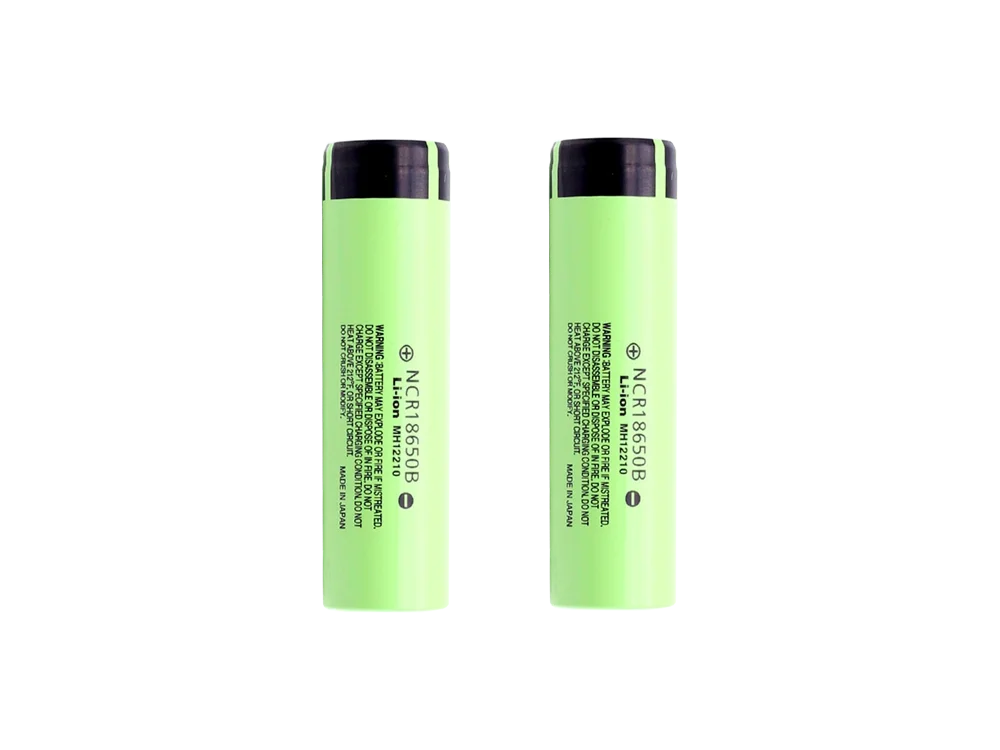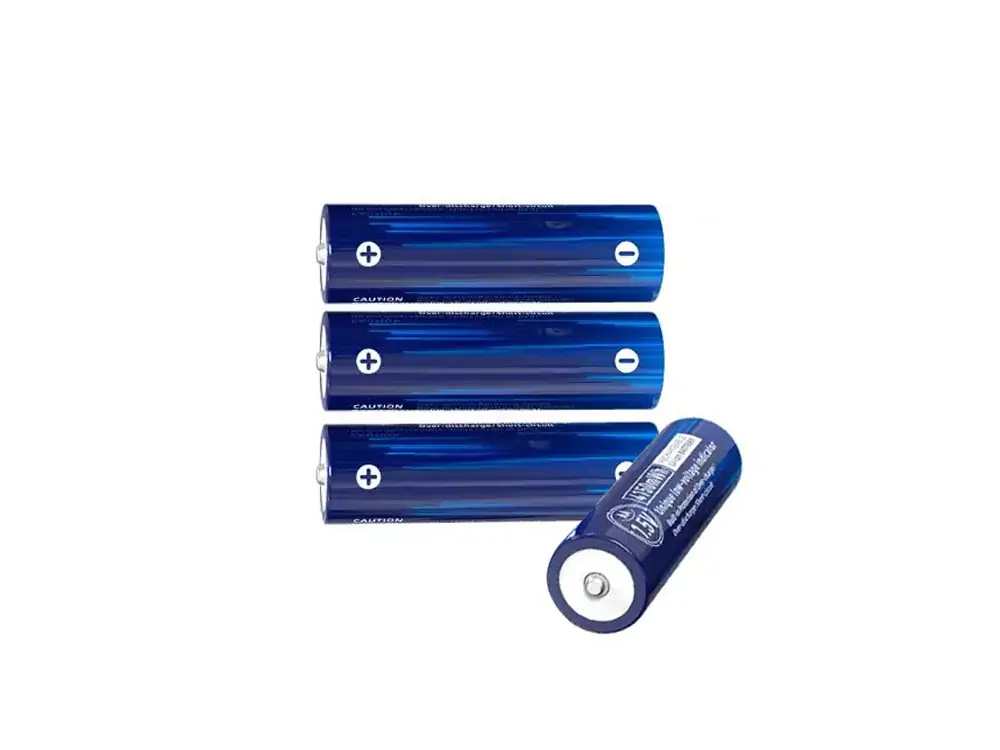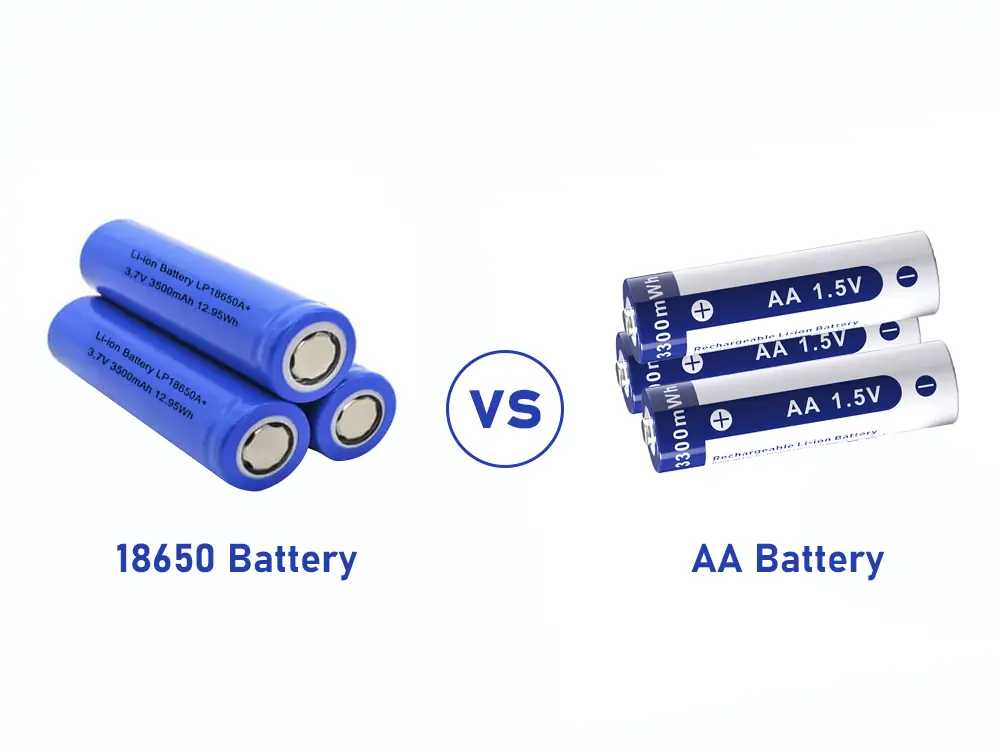Batteries are versatile, portable, and, well, powerful. However, a battery’s strength depends on its internal properties. Hence, not every battery type is suitable for all applications. In this post, we will talk about two popular and specific kinds- AA and 18650 batteries. Although these two provide energy for everyday use, several differences set them apart. This guide will dive deep into these differences and resolve any confusion on the 18650 battery VS AA battery.
What Is an 18650 Battery?

This cylindrical-shaped battery is a rechargeable lithium-ion, named after its dimensions. 18650 batteries have a nominal voltage of 3.7V and a capacity range of 2000mAh to 3500mAh.
In general, lithium-ion batteries are sensitive to charging and discharging. As a result, most 18650 batteries have tiny in-built battery management systems (BMS). These systems function to protect these batteries from overcharging and discharge. Some applications of 18650 batteries are in power banks, E-cigarettes, high-power flashlights, etc.
What Is an AA Battery?

AA batteries are the standard size of cylindrical battery cells used in portable electronics. They are smaller than 18650s and available in both rechargeable and non-rechargeable versions. The voltage of an AA battery varies by type. Its alkaline variants have a nominal voltage of 1.5V, while NiMH has a nominal voltage of 1.2V.
AA batteries are suitable for low- to medium-drain gadgets. They are found in wall clocks, toys, game controllers, and wireless mice.
Differentiating the AA VS 18650 Battery

18650 Battery VS AA Battery: Size and Form
One obvious difference between 18650 and AA battery is their physical dimensions and shapes. As its name suggests, an 18650 battery is 18 mm in diameter and 65 mm in length. This gives it a cylindrical shape that is noticeably larger than the AA battery. In contrast, AA batteries are small. They measure approximately 14.5 mm in diameter and 50.5 mm in length.
18650 VS AA battery dimensions play a vital role in their functionality. For instance, the larger size of an 18650 battery allows it to pack more energy into a single cell. But, this also means that devices must follow specific designs to accommodate their dimensions.
On the other hand, AA batteries are the standard choice for consumer electronics. Their smaller size makes them incredibly versatile and suitable for many devices, like toys and remote controls. However, the compact form of a AA battery means it has less capacity than 18650 batteries.
18650 Battery VS AA Battery: Capacity and Power Output
Energy storage is a major factor in the battle between an AA battery VS 18650 battery. The 18650 batteries outperform AA batteries in this regard. Many 18650 batteries boast a capacity ranging from 2000mAh to 3500mAh and can be higher in advanced models. In comparison, standard AA batteries offer between 2000mAh and 3000mAh for alkaline batteries. They also provide 700mAh to 1500mAh for Nickel-based variants.
18650 batteries hold more charge and deliver it differently from AA batteries. The design of these batteries allows them to provide 3.7V throughout most of their discharge cycles. This makes an 18650 battery ideal for devices that require consistent power output.
The difference in voltage and capacity of an AA VS 18650 battery influences their applications. For instance, 18650 batteries are better for high-drain devices like powerful flashlights, vaporizers, and electric cars. However, although AA batteries are less powerful, they are ideal for low- to moderate-drain devices. These devices are household items, where AA batteries offer the advantage of being easily replaceable.
18650 Battery VS AA Battery: Recharge and Lifespan
18650 and AA batteries have rechargeable variants, but some key differences determine if they are reusable.
For instance, nearly all 18650 batteries have lithium-ion chemistry and are rechargeable. You can charge them hundreds or even thousands of times so far you take care of them. AA batteries, however, come in disposable (alkaline) and rechargeable (NiMH) versions. In recent years, rechargeable AAs have become more popular. They are eco-friendly, and help users save on long-term costs.
In terms of lifespan, well-maintained 18650 batteries can last several years with regular charging. High-quality 18650 batteries can last up to 500 charge cycles. In advanced models, they can last 1000 cycles. Rechargeable AA batteries also offer long-lasting performance of 3 years or longer. But they might need replacement after a few hundred cycles.
Disposable AA batteries are single-use items, which contributes to more waste production. However, this also makes them suitable for emergencies and rarely used devices.
18650 Battery VS AA Battery: Cost and Availability
Cost-wise, AA batteries have a clear advantage over 18650 batteries. They are ubiquitous and available in every supermarket, convenience store, and electronics shop. They are also easy to find, which makes them an attractive option for customers who prioritize comfort.
In contrast, while 18650 batteries are popular, they are still mainly sold in specialty electronics shops or by online retailers. Compared to AA batteries that you will find in any walk-in supermarket, 18650 batteries aren’t so available. This is a drawback for users and situations where quick replacement is necessary.
In the battle of 18650 VS AA battery, using cost to decide the winner is not always so simple. Although disposable AA batteries are cheaper upfront, the long-term replacement costs can add up quickly for high-drain devices. On the other hand, 18650 batteries are pricier but economical due to their high capacity and ability to charge for hundreds of cycles.
Therefore, when choosing between an 18650 and an AA battery, select the option that aligns with your current needs. If you need a battery that you can use without changing for years, go for an 18650. But if you want one you can use on household items like remote controls, choose AA batteries.
18650 Battery VS AA Battery: Specific Uses and Applications
The choice between the 18650 VS AA battery often depends on the specific device or application.
18650 batteries excel in high power and capacity scenarios.
They are common in:
- Vaporizers and E-cigarettes
- Laptop battery packs
- Electric bicycles
- Electric scooters
- Powerbanks for mobile phones
- Cordless power tools
- Portable speakers
- LED flashlights.
AA batteries are versatile and easy to use. They are compatible with many devices, making them a preferred choice for consumer products. AA batteries work best with gadgets that require little to moderate power output.
Some examples of their applications are in the following:
- Remote controls
- Wireless keyboards and mice
- Digital cameras
- Toys
- Handheld GPS devices
- Calculators
- MP3 players
Choosing between these battery types depends on the power requirements, design, and user convenience.
For example, an 18650 battery could power a remote control. However, an AA battery’s ubiquity and low-power requirements make it a more practical choice for remotes. In contrast, 18650 batteries favor devices with long runtime between charges and high-power requirements.
It is worth noting that some devices can accommodate both battery types. But this is only through the use of adapters. Examples of these devices are headlamps, flashlights, and laser pointers.
So, if you’ve been thinking, “Can I use AA batteries instead of 18650?” the answer is yes. All you need is a battery adapter for your AA batteries.
Are 18650 Batteries the Same as AA Batteries?
A common question people ask when they discuss battery types is whether 18650 batteries are the same as AA batteries. The short answer is no. 18650 and AA batteries are different. They differ in many aspects, most of which we’ve covered in the above sections. The main factors that set these batteries apart are:
- Size and shape
- Voltage or power output
- Capacity
- Applications
In Conclusion
There is no clear winner in the battle of 18650 VS AA Battery. Each battery has its set of strengths and applications. 18650 batteries have greater capacity, and power output, and can be recharged continuously. This makes them perfect for draining applications and devices where long runtime is crucial. However, their large size and limited availability can be drawbacks in certain scenarios.
AA batteries are easy to replace, compatible with many gadgets, and less expensive. They are the go-to choice for an extensive range of consumer electronics. Although they don’t match the raw power and capacity of the 18650s, their versatility and comfort orientation keep them relevant in the market.
Finally, the choice between 18650 and AA batteries depends on your needs, devices, and priorities.
When you know the difference between these two popular battery types, you can make conscious decisions about your choice.
